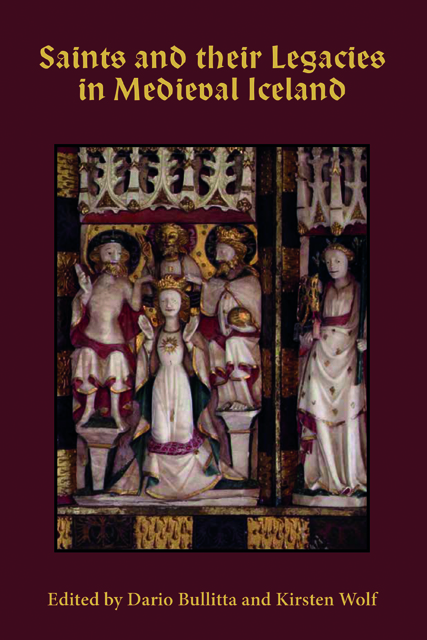Book contents
- Frontmatter
- Contents
- List of Illustrations
- List of Contributors
- Acknowledgments
- List of Abbreviations
- Introduction: The Splendor of the Saints
- Rannsǫkun Heilagra Bóka: The Search for Holy Books
- Heilagir Byskupar: Holy Bishops
- Heilagir Karlar ok Englar: Holy Men and Angels
- Heilagar Meyjar: Holy Maidens
- Bibliography
- Index of Manuscripts
- General Index
- Studies in Old Norse Literature
3 - The Tuscan Provenance of Framfǫr Maríu
Published online by Cambridge University Press: 14 January 2023
- Frontmatter
- Contents
- List of Illustrations
- List of Contributors
- Acknowledgments
- List of Abbreviations
- Introduction: The Splendor of the Saints
- Rannsǫkun Heilagra Bóka: The Search for Holy Books
- Heilagir Byskupar: Holy Bishops
- Heilagir Karlar ok Englar: Holy Men and Angels
- Heilagar Meyjar: Holy Maidens
- Bibliography
- Index of Manuscripts
- General Index
- Studies in Old Norse Literature
Summary
hverr er þesse sva miklo dyrlegre en adrar Ct 6:9
er vppsteig sva sem vprisande dags brvn Ct 6:3
fogr sem tungl valið sem sol
ogorlig sem skipot fylking hermanna
Vespers antiphon for the Feast of the Assumption (August 15)
Untouched by original sin, Mary of Nazareth attained unrivaled popularity in the history of Christianity with a cult that is exceeded only by that of Christ himself. Mary is still the most honored and venerated saint in the Roman Catholic Church, a highly privileged status testified to by her eminent degree of worship and by her countless poetic epithets, tutelary titles, scriptural typologies, and honorific salutations. More than fifty formal and informal Marian titles are collected in the petitions of the Litaniae Lauretanae, the most widely disseminated praises and supplications to the Virgin that officially became part of the rosary ritual from the last quarter of the sixteenth century. Among these, four invocations have a profound rhetorical and theological poignancy, since they profess the great Marian dogmas of divine motherhood, perpetual virginity, immaculate conception, and glorious Assumption. They were proclaimed as truth by four ecclesiastical decrees: ‘Sancta Dei Genetrix’ (‘Holy Bearer of God’) [≈ ‘Deipara’ (‘Bearer of God’) Council of Ephesus, AD 431]; ‘Maria Semper Virgo’ (‘Mary Ever Virgin’) [≈ ‘Semper Virgo’ (‘Ever Virgin’) Lateran Synod, AD 649]; ‘Regina sine labe concepta’ (‘Queen conceived without sin’) [≈ ‘In primo instanti suae conceptionis […] ab omni originalis culpae labe praeservatam immunem’ (‘In the first instance of her conception […] she was preserved free from all stain of original sin’) Infallibilis Deus, 1854]; and ‘Regina in caelum assumpta’ (‘Queen assumed into heaven’) [≈ ‘Corpore et anima ad supernam Caeli gloriam eveheretur, ubi Regina refulgeret ad eiusdem sui Filii dexteram, immortalis saeculorum Regis’ (‘She might be taken up body and soul to the glory of heaven, where as Queen she sits in splendor at the right hand of her Son, the immortal King of the Ages’) Munificentissimus Deus, 1950].
Despite the late date of Munificentissimus Deus, attempts to promote Mary’s bodily assumption date back as far as Late Antiquity, when an impressive number of hymns, sermons, and apocryphal narratives describing Mary’s death and departure into Paradise were first composed.
- Type
- Chapter
- Information
- Saints and their Legacies in Medieval Iceland , pp. 61 - 96Publisher: Boydell & BrewerPrint publication year: 2021

